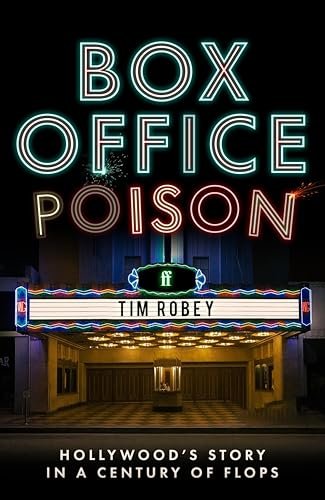
Book Review of Box Office Poison: Hollywood's Story in a Century of Fl…
One Centenary of Flops: A Personal Reflection on Box Office Poison: Hollywood’s Story in a Century of Flops
As a long-time lover of film, I’ve often found myself drawn to stories of triumph, big budgets, and box office hits. However, it was the title Box Office Poison: Hollywood’s Story in a Century of Flops by the insightful film critic Tom Robey that sparked my curiosity and beckoned me into a nearly hidden corner of cinematic history. Who doesn’t love a good tale of failure, especially when it illuminates the often shadowy intricacies of a world as glittering as Hollywood?
Robey opens the door to a century of Hollywood flops, showcasing major disasters like Doctor Dolittle (1967) and Cats (2019) with a blend of thorough research and a wry sense of humor that had me chuckling as I cringed for the creative souls involved. The phrase “box office poison” itself has a fascinating backstory, tracing back to a 1938 ad by the Independent Theatre Owners Association, which shone a light on once-beloved stars who had turned into costly, unbankable liabilities. The likes of Mae West and Greta Garbo received the dubious honor of being labeled as “poison” for studios, a stark reminder of how fickle fame can be.
In his methodical prose, Robey strikes an incredible balance between straightforward analysis and sharp wit. He examines not just the films but the lives interwoven with each failure. Understanding the human impact of these catastrophic releases—be it directors, writers, or the actors hoping for a resurgence—gave me a deeper appreciation for the stakes at play in the film industry. As I read, I found myself rooting for those involved, hoping their careers would rebound from the wreckage.
The structure of the book appeals to those with a decent grasp of film history. Robey doesn’t shy away from statistics and facts, but his delivery is anything but dry. His insights are informed yet accessible, making it a delight for cinephiles who yearn for more than just surface-level analysis. My personal favorite moments came when Robey highlighted the absurdity surrounding each film’s production—take Speed 2: Cruise Control, for instance. What a fascinating dive into how ambition can lead to a calamitous crash!
While this book certainly caters to a niche audience, I believe it serves as a profound reminder about the nature of storytelling itself. Flops reveal as much about audience expectations and cultural shifts as successes do. If you’re a fan of behind-the-scenes accounts and enjoy a healthy dose of schadenfreude when a film misfires, then you’ll find this book as engaging as it is enlightening.
In closing, Box Office Poison is a compelling read for anyone who’s ever wondered what went wrong in cinematic history. Whether you’re a seasoned film buff or simply curious about Hollywood’s more unfortunate offerings, Robey’s narrative will resonate. It left me with a sense of camaraderie with the creators of these flops, as the tales he told became a testament to the unpredictable nature of art—and, of course, the audacity to dream big in an unforgiving world.
Discover more about Box Office Poison: Hollywood's Story in a Century of Fl… on GoodReads >>

